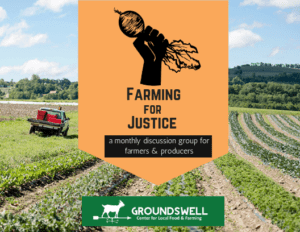
Experience of Food Insecurity at Cornell University – FFJ July Discussion
Panel feat. Marquan Jones, Cornell ’20, and Kathleen Pasetty, owner of Manndible Cafe
This month’s Farming for Justice Discussion Group was just the tip of the iceburg as far as the local conversation goes about food insecurity, and experiences surrounding it at Cornell University. We were fortunate enough here at Groundswell Center to facilitate the sensitive topic surrounded by stigma with local community members and university students.
Marquan Jones, rising Engaged Scholar senior at Cornell University, majoring in Developmental Sociology with a minor in Community Food Systems led the conversation, which was complemented by Kathleen Pasetty, owner of a local food café, Manndible Café, which is located on the Cornell University Campus.
The overall questions that framed the discussion were:
- How does food insecurity effect people differently in college than other spaces?
- What kinds of resources are most impactful?
- How does food insecurity create larger impacts on college communities?
We had students from Cornell, from Anabel’s Grocery, amongst other members of educational institutions that contributed to the conversation.
The summation of the short conversation was that access to fresh, nutritious food is not easy, with many of the students residing on a part of campus that is not near where food is accessible. This lended itself to discussion around accessibility, and the intersections of race and social class, and the current initiatives that exist on campus that I will shortly describe below: Bread n Butter food pantry, Manndible Café, Anabel’s Grocery, the Community Food Systems minor program.
Bread N Butter, a food pantry serving 150-170 students per week, founded and run by a graduate student, has been tackling the issue of food insecurity since September by providing free cooked meals to the campus community. The food pantry, which is currently operating out the space that occupied Anabel’s Grocery, draws from excess food from on-campus dining halls and Friendship Donations Network, a local organization that redistributes food to prevent food waste. It is starting a pilot program that will allow students who have bonus meals on their meal plans to donate them for students in need, in collaboration with Anabel Grocery, Shakima Clency, associate dean of students for student empowerment and director of first-generation and low-income student support, has been in dialogue both with students in need and with student groups interested in addressing these challenges to allocate resources address the issue systemically.
Anabel’s Grocery, a project of the Center for Transformative Action at Cornell, provides fresh, nutritious and affordable food for all Cornell students. Through our store and educational programs, we provide information about the connection between quality food, health, justice and sustainability. By collaborating with diverse student organizations and local food producers, our student-run, nonprofit food store is a learning lab dedicated to creating an equitable and ecologically-sound food system. Contributing to the conversation greatly, sharing statistics from Cornell University, collected by PULSE.
Many sources were cited and shared in the conversation, from Haslow’s Hierarchy of Needs to a book written by the Community Food Systems Cohort, which Marquan is a part of and shared some of the work he contribute to the book, from the Community Food Systems Program at Cornell University. This program is a university-wide program enabling undergraduate students to engage with critical contemporary issues relating to food security, food sovereignty, and food justice. In a context of diverse goals and approaches, the CFS Minor focuses on working with community partners to collaboratively understand and develop sustainable community food systems.
Overall, it was truly a powerful conversation to help facilitate at Groundswell Center, and we hope that our contribution will continue to help the efforts of addressing experiences of food insecurity at Cornell University.
We thank those who are part of the initiatives at Cornell and we thank Marquan for speaking up, when often times, stigma around the experience of food insecurity prevents many from discussing it at all.
We didn’t remember to press record upon the beginning of the Zoom call, and we are so sorry! Please feel free to contact us, or any of those mentioned above for more information.
